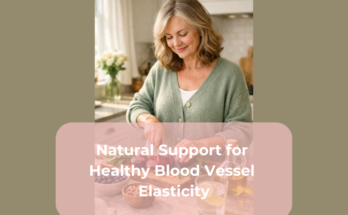As the years pass, protecting your vision becomes more important than ever. Blurry sight, dry eyes, and age-related changes like macular degeneration or cataracts can sneak in silently — but you’re not powerless. In fact, what you feed your body today can shape how clearly you see tomorrow.
Here are six science-backed nutrients that play a powerful role in supporting healthy eyes — especially for women over 50.
1. Lutein
Lutein is often called the “eye vitamin,” and for good reason. Found in leafy greens like kale and spinach, lutein helps filter harmful blue light and supports the retina — particularly the macula, the area responsible for sharp, central vision.
Why it matters: As we age, lutein levels naturally decline. Supplementing can help preserve clarity and reduce strain from screens and sunlight.
2. Zeaxanthin
Zeaxanthin works hand-in-hand with lutein to protect your eyes from oxidative damage. These two carotenoids are concentrated in the macula, where they serve as natural sunglasses for your eyes.
Best sources: Go for corn, orange peppers, egg yolks, and eye-support supplements for consistent intake.
3. Omega-3 Fatty Acids
Dry, irritated eyes? Omega-3s (especially DHA and EPA) help reduce inflammation and keep your tear film smooth and stable. These healthy fats also support visual development and overall eye comfort.
Tip: Flaxseeds, walnuts, and oily fish like salmon are great dietary sources — or go for a plant-based omega-3 supplement.
4. Vitamin A
This essential vitamin is known for protecting the cornea (the surface of the eye) and supporting night vision. It also prevents dry eyes by helping the body produce healthy tears.
Signs of deficiency: Difficulty seeing in low light, dry or irritated eyes.
5. Vitamin C
Antioxidants like vitamin C protect the eyes from oxidative stress — a major player in age-related eye conditions like cataracts. It also helps the body build collagen, which maintains the structure of the eye.
Include it daily: Oranges, strawberries, red peppers, and supplements are all good sources.
6. Zinc
Zinc is a trace mineral that plays a vital role in transporting vitamin A to the retina. Without enough of it, vision can become compromised over time.
Bonus: Zinc may also slow the progression of macular degeneration.
🌿 Add LiveGood for Extra Support
To make your eye health routine extra powerful, consider LiveGood’s Multivitamin for Women. It includes antioxidant-rich vitamins A, C, and E — plus essential minerals like zinc and selenium to nourish your whole body, including your vision.
🔗 Check out the full LiveGood range here »
🧡 Bringing It All Together
Caring for your eyes in midlife doesn’t mean overhauling your entire life — just making small, daily choices that support your future. With the right nutrients, a few healthy habits, and a commitment to your well-being, you can enjoy clearer, more comfortable vision for years to come.



